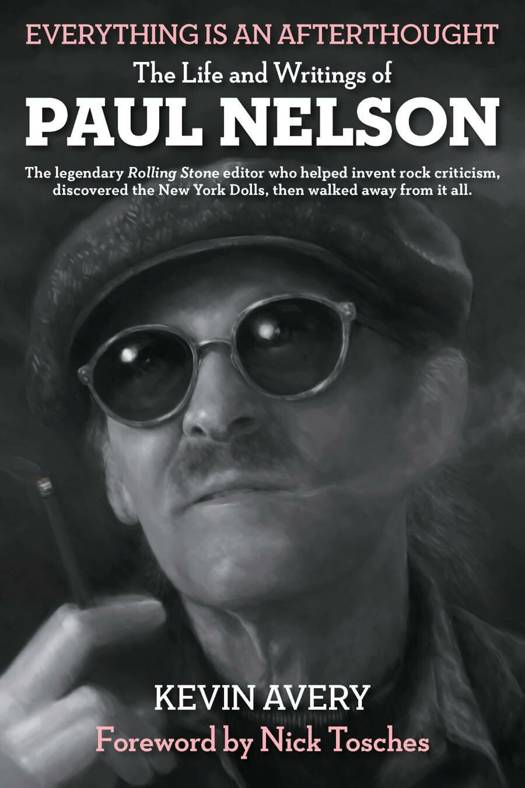
- Retrait gratuit dans votre magasin Club
- 7.000.000 titres dans notre catalogue
- Payer en toute sécurité
- Toujours un magasin près de chez vous
- Retrait gratuit dans votre magasin Club
- 7.000.000 titres dans notre catalogue
- Payer en toute sécurité
- Toujours un magasin près de chez vous
Everything Is an Afterthought
The Life and Writings of Paul Nelson
Kevin Avery
Livre relié | Anglais
41,95 €
+ 83 points
Description
What happened to Paul Nelson? In the '60s, he pioneered rock & roll criticism with a first-person style of writing that would later be popularized by the likes of Tom Wolfe and Norman Mailer as "New Journalism." As co-founding editor of The Little Sandy Review and managing editor of Sing Out!, he'd already established himself, to use his friend Bob Dylan's words, as "a folk-music scholar"; but when Dylan went electric in 1965, Nelson went with him.
During a five-year detour at Mercury Records in the early 1970s, Nelson signed the New York Dolls to their first recording contract, then settled back down to writing criticism at Rolling Stone as the last in a great tradition of record-review editors that included Jon Landau, Dave Marsh, and Greil Marcus. Famously championing the early careers of artists like Bruce Springsteen, Jackson Browne, Rod Stewart, Neil Young, and Warren Zevon, Nelson not only wrote about them but often befriended them. Never one to be pigeonholed, he was also one of punk rock's first stateside mainstream proponents, embracing the Sex Pistols and the Ramones.
But in 1982, he walked away from it all -- Rolling Stone, his friends, and rock & roll. By the time he died in his New York City apartment in 2006 at the age of seventy -- a week passing before anybody discovered his body -- almost everything he'd written had been relegated to back issues of old music magazines.
How could a man whose writing had been so highly regarded have fallen so quickly from our collective memory? With Paul Nelson's posthumous blessing, Kevin Avery spent four years researching and writing Everything Is an Afterthought: The Life and Writing of Paul Nelson. This unique anthology-biography compiles Nelson's best works (some of it previously unpublished) while also providing a vivid account of his private and public lives. Avery interviewed almost 100 of Paul Nelson's friends, family, and colleagues, including several of the artists about whom he'd written.
During a five-year detour at Mercury Records in the early 1970s, Nelson signed the New York Dolls to their first recording contract, then settled back down to writing criticism at Rolling Stone as the last in a great tradition of record-review editors that included Jon Landau, Dave Marsh, and Greil Marcus. Famously championing the early careers of artists like Bruce Springsteen, Jackson Browne, Rod Stewart, Neil Young, and Warren Zevon, Nelson not only wrote about them but often befriended them. Never one to be pigeonholed, he was also one of punk rock's first stateside mainstream proponents, embracing the Sex Pistols and the Ramones.
But in 1982, he walked away from it all -- Rolling Stone, his friends, and rock & roll. By the time he died in his New York City apartment in 2006 at the age of seventy -- a week passing before anybody discovered his body -- almost everything he'd written had been relegated to back issues of old music magazines.
How could a man whose writing had been so highly regarded have fallen so quickly from our collective memory? With Paul Nelson's posthumous blessing, Kevin Avery spent four years researching and writing Everything Is an Afterthought: The Life and Writing of Paul Nelson. This unique anthology-biography compiles Nelson's best works (some of it previously unpublished) while also providing a vivid account of his private and public lives. Avery interviewed almost 100 of Paul Nelson's friends, family, and colleagues, including several of the artists about whom he'd written.
Spécifications
Parties prenantes
- Auteur(s) :
- Editeur:
Contenu
- Nombre de pages :
- 512
- Langue:
- Anglais
Caractéristiques
- EAN:
- 9781606994757
- Date de parution :
- 21-11-11
- Format:
- Livre relié
- Format numérique:
- Genaaid
- Dimensions :
- 155 mm x 231 mm
- Poids :
- 1043 g







